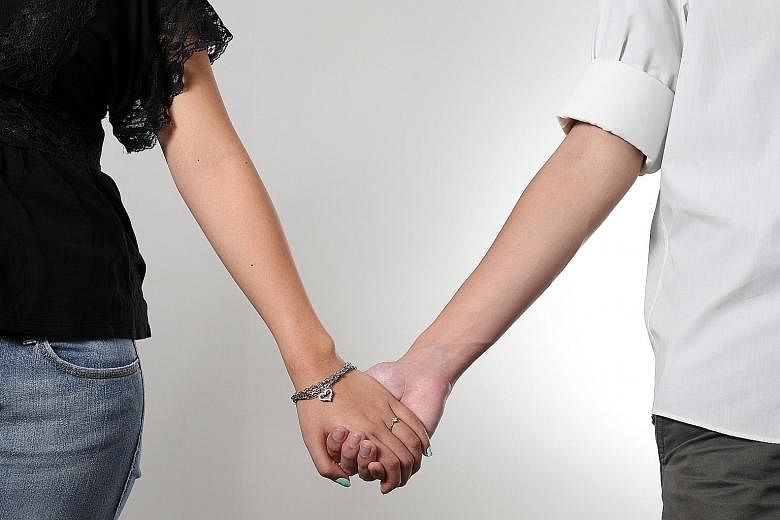Unmarried women abused by their boyfriends cannot apply for a personal protection order (PPO) from the courts to stop the violence, and social workers hope this will change.
Pave, a charity specialising in tackling family violence, has submitted a paper to the Ministry of Social and Family Development (MSF) detailing why those in intimate heterosexual relationships, such as dating or cohabiting couples, should be allowed a PPO.
Currently, a person can apply for a PPO only against a family member, such as a spouse, parent or sibling.
Pave posted its paper on the website of Reach, the Government's feedback unit, on Oct 20, after the MSF sought public feedback to proposed changes to the Women's Charter on Oct 19.
Pave executive director Sudha Nair told The Sunday Times that more women are calling the organisation for help as their boyfriends or live-in partners are abusive. Some even ended up in hospital after being battered repeatedly.
So far this year, 41 such women have called Pave for help, compared with 31 for all of last year.
Dr Nair said: "The vast majority of these women did not come back (to Pave) after finding out there was no protection available for them, other than making a police report or a Magistrate's Complaint."
She added that making a police report may not help much to stop the abuse, as the police may not arrest the abuser.
Lawyers explain that unless these women suffer "grievous hurt", such as life-threatening injuries or permanent disfigurement, the police cannot arrest the abuser without a warrant.
Lawyer Ellen Lee said: "A woman can be hit repeatedly, but it may be considered a non-arrestable offence if there are no grievous injuries. The police may not act as they deem it a domestic matter between the couple. It is an uphill task for unmarried women to get legal protection now."
Lawyer Malathi Das, president of the Singapore Council of Women's Organisations (SCWO), noted that abused women - wed or unwed - face the same struggles that prevent them from ending an abusive relationship.
She said it is unrealistic to subject the unwed women to criminal laws, instead of laws designed to stop domestic violence.
She said: "Do we want to wait until someone is grievously hurt before the criminal laws kick in and the police arrest the abuser?"
However, if an unwed woman has a PPO, the police can arrest the abuser the next time he hits her, regardless of the severity of the abuse.
The PPO is also more effective in quickly putting a stop to domestic violence, compared with filing a Magistrate's Complaint with the courts to seek redress for the abuse, the lawyers said.
Dr Nair said it is far from easy for unmarried women to walk out of their abusive relationships.
Some fear that the men would hurt them terribly if they leave.
Others hope he would change for the better.
Take, for example, a woman in her 30s whose taxi driver boyfriend threatens her family whenever she tries to leave him, her social worker, Madam Adisti Jalani, said. She was tied to him as they live together and he supports her financially.
Madam Adisti said: "If she disagreed with him, he would kick, punch or strangle her."
He once beat her so badly that she needed several eye operations.
Dr Nair said that it is important to nip violence in the bud, even among dating couples.
This is because an average of about one in five people who were abused by their spouses or were abusive themselves said the violence started when they were dating, going by Pave's spousal violence cases for its past three financial years.
The Association of Women for Action and Research (Aware) and the SCWO support Pave's proposal.
Aware said that its Sexual Assault Care Centre (SACC) and its helpline regularly get calls from singles who are abused by their partners. So far this year, the SACC has helped 23 such cases.
An MSF spokesman told The Sunday Times that there are laws to protect these women, such as the Penal Code and the Protection from Harassment Act.
She added: "We will seriously consider all feedback for the Women's Charter public consultation, welcome other views on Pave's proposal or other suggestions to better protect victims against violence and harassment."


